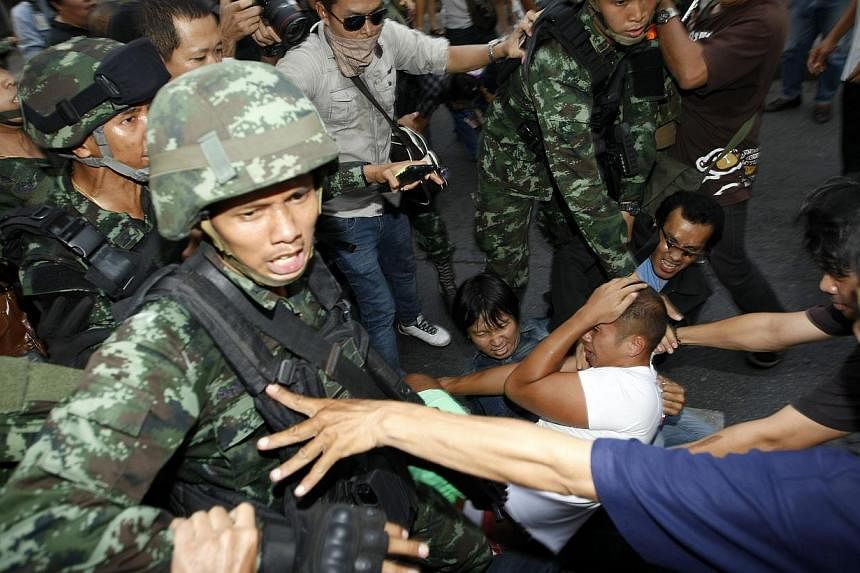BANGKOK (REUTERS) - Thailand's military will tighten its grip on power on Sunday as it moves to douse smouldering protests before they flare and rally commercial agencies and business to revitalise the country's battered economy.
The military stepped in to overthrow the government on Thursday to end months of debilitating confrontation between the royalist political and security establishment and a populist government adored by the rural and urban poor.
Critics say the coup will not end the conflict between the rival power networks: the Bangkok-based elite dominated by the military, old money families and the bureaucracy, and an upstart clique led by former telecommunication mogul Thaksin Shinawatra which draws much of its strength from the provinces.
The military has detained leaders of the ousted government including the self-exiled Thaksin's sister, former Prime Minister Yingluck Shinawatra, and an unknown number of her ministers, party officials, and supporters.
It has thrown out the constitution, censored the media and on Saturday it dismissed the upper house Senate, Thailand's last functioning legislature, in what amounts to a clean sweep of the political landscape.
Power now lies squarely in the hands of army chief General Prayuth Chan-ocha and his junta known as the National Council for Peace and Order.
The military has summoned political, media, academic and civil service groups since the coup. Many of the politicians have been detained while others such as civil servants have been exhorted to work for the country.
Eighteen newspaper bosses have been summoned to appear on Sunday, presumably to receive directions on supportive coverage.
The military has called meetings with the leaders of state and private commercial organisations, senior officials of the commerce, finance and energy ministries and business leaders, oil trade and transport companies.
"From now on, the army will focus on solving the country's problems," a senior military official said on Saturday. "The army would like to be in power for the shortest period they can. They want to make sure the country is really getting back to normal without any resistance," said the official, who declined to be identified.
PROTESTS
Six months of anti-government protests that finally led to the coup, the latest outbreak of a nearly decade-long clash between the establishment and Thaksin, have dragged down Southeast Asia's second-biggest economy, which shrank 2.1 perecent in the first quarter of the year.
Some analysts fear the country could slide into recession if the political crisis drags on.
The military, which has launched 19 successful or attempted coups since the end of absolute monarchy in 1932, will probably have to rely on civilian expertise although for now, Gen Prayuth has made no move to bring in technocrats.
In what appeared to be a quick move to win over some of Thaksin's core supporters, Gen Prayuth said paying farmers money owed under a failed subsidy scheme organised by Yingluck's government was a priority.
The military has banned gatherings of more than five people, censored the media and imposed a 10pm to 5am curfew, but that has not deterred some critics.
About 200 people marched in Bangkok on Saturday, many with handwritten signs such as "Anti the Coup" and "Get out Dictators". There was some scuffles with police and several people were detained but no serious violence.
About 200 people also gathered in the northern city of Chiang Mai, Thaksin's hometown, and soldiers detained at least six people, a Reuters reporter said.
Such small protests appear spontaneous and leaderless but the real danger for the military would be a sustained mass campaign by Thaksin's "red shirt" loyalists.
At a meeting in Chiang Mai on Saturday, the army ordered police and officials to squash anti-army dissent or face transfer. The call reflects the army's unease about control of the north and northeast, hotbeds of support for the Shinawatras.
Many countries have issued travel warnings for Thailand.
The United States swiftly condemned the coup and State Department has suspended about US$3.5 million (US$4.4 million) in military aid, including a portion for training. The Pentagon said it was cancelling various training exercises and visits by commanders.

